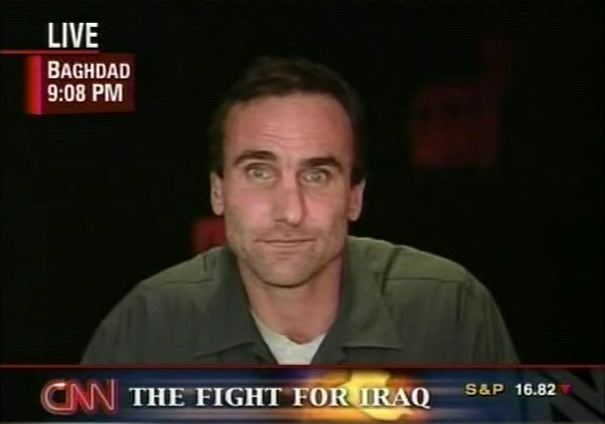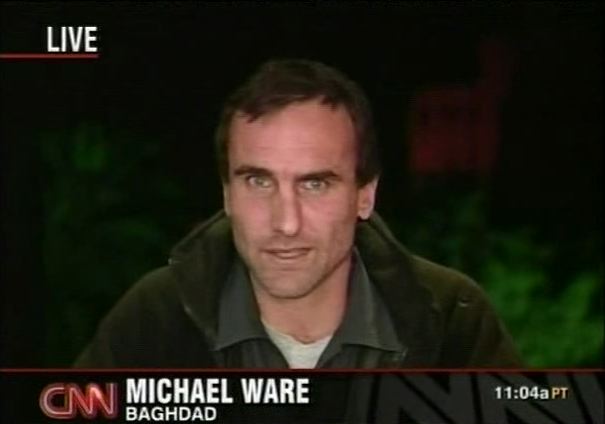NR: It's a damn civil war, people.

Click photo to play
Length: 3:58
KYRA PHILLIPS: The official curfew is over, and Iraq's president has left the country on a business trip. But thousands, maybe millions of ordinary Iraqis dare not leave their homes.
Let's go straight to Baghdad and CNN's Michael Ware -- Michael.
MICHAEL WARE, CNN CORRESPONDENT: Yes, Kyra, the curfew, as you said, has lifted. Nonetheless, this morning, as many as 39 executed bodies were found on the streets of the capitol. And in the town of Baquba, just north of Baghdad, 12 more bodies were found.
We also see the continuation of what's becoming a daily phenomenon here in this city, which is neighborhood mortar wars. Firing bombs at each other. We've seen another neighborhood in the capital hit. There's reports of at least three dead and 15 more wounded.
There's been some sporadic attacks on Iraqi police. There's at least one dead police officer as a result.
Essentially, this is a city that's almost socially paralyzed by fear. People dare not leave their homes. The education system is grinding to a halt. Teachers are not showing up at schools. Students aren't attending classes. Families aren't prepared to leave their homes.
And reading Iraqi weblogs has become the most illuminating exercise. Electronic Iraq is an organization which culls these things, has posted a number of these references. We have people in suburbs saying, "My suburb is under attack now, I can hear gunfire. We've been under mortar attack for two days. God save us."
Someone else saying, "Our suburb is running out of ammunition. Please, come to our aid."
Another one saying, "Our suburb is breached. We will fight to the death." That's what's become of Baghdad.
PHILLIPS: Michael Ware, interesting point is you give us these descriptions. All you can think about is, is there a civil war or not? Some journalists becoming a little more daring and saying, yes, there's a civil war going on here. Others not saying that.
King Abdullah doing an interview on ABC this week, saying, still, potential civil war. When exactly can you say as a journalist, as a politician, as an administration, all right, there's a civil war going on right here. This is how you define it.
WARE: Well, put it this way, this is the way I define it. It's that anyone who still remains in doubt about whether this is civil war or not is suffering from the luxury of distance.
You stand here on these streets, you take shelter in these families' homes. You dare to go out and try to go to work or, indeed, shop at a marketplace and you will know that this is civil war.
There are already signs of what technically could be declared ethnic cleansing. The United Nations says entire neighborhoods are being disrupted to various degrees. Communities being split. I mean, we have areas that people of one sect cannot enter for fear of immediate execution by another sect.
You drive in a minibus on your way to work. Suddenly, there's a check point. If you're of the wrong faith, you are dead.
There's literally defensive fighting positions now built in some of these suburbs. And the Sadr City quarter of Baghdad, the Shia domain, where as much as half of the population lives, is essentially now a garrison, servicing outlying Shia militia outposts as it wages its retaliatory strikes for the deadly multiple car bombing on Thanksgiving Day which saw 200 innocents slain in the streets in Sadr City.
If that's not civil war, if we don't have two sides of a nation going face to face, then, honestly, I don't know what is, Kyra.
PHILLIPS: Michael Ware couldn't have put it more directly. Live from Baghdad, thanks.

Click photo to play
Length: 2:25
T.J. HOLMES: The official curfew is over and Iraq's president has left the country on a business trip, but thousands, maybe millions of ordinary Iraqis dare not leave their own houses.
We're going to go now to Baghdad and CNN's Michael Ware.
Hello again, Michael.
MICHAEL WARE, CNN CORRESPONDENT: Yes, T.J., the curfew has been lifted, three days of lockdown following last Thursday's Thanksgiving car bombing massacre against the Shia population of the capital, Baghdad. At least 200 people died in that attack, hundreds more wounded.
Since then, we've seen retaliation from Shia militias. Things have deteriorated where we're seeing neighborhood against neighborhood engaging in mortar wars, lobbing bombs upon each other.
Now, while there remains a debate back home in the U.S. about whether there's a civil war, that debate is fueled by the luxury of distance. Anyone here on these streets living this up close and personal has no question in their minds whatever. This is civil war.
And you look at all the various definitions and the elements of civil war. Some say that it's two large groups fighting for the political center, where at least a thousand people must have died with at least 100 on either side. There must be militia-style combat, elements of ethnic cleansing, neighborhood on neighborhood, family on family, and some degrees of organization and coordination.
Well, T.J., you can tick every box of that. This morning alone, after a three-day lockdown, there were still 39 executed bodies on the streets of the capital. Death squads still roam the city, many of them institutionalized in police uniforms.
Citizens have to carry dual identity, one Sunni, one Shia. Children can't go to school for fear of crossing ethnic boundaries. Neighborhoods have fighting positions.
People are communicating by SMS and phone messages about roaming militia gangs. And we're seeing on blogs desperate calls for help.
If this is not civil war, T.J., then I don't want to see one when it comes.
HOLMES: Wow. All right.
Michael Ware for us in Baghdad.
Thank you so much, as always.
